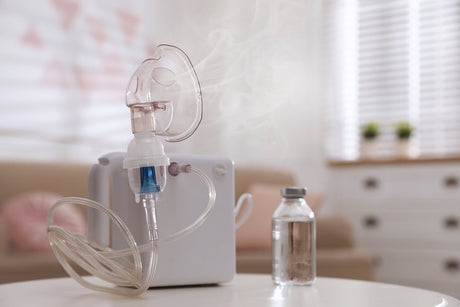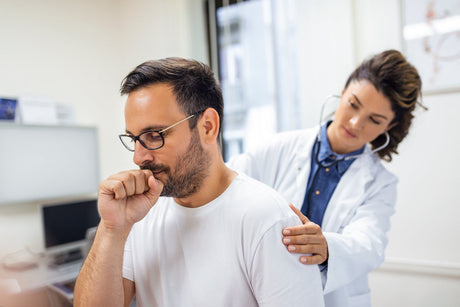If you have a respiratory illness, such as chronic obstructive pulmonary disease (COPD), asthma, or pulmonary fibrosis, you may struggle with shortness of breath, fatigue, and reduced quality of life. You may also be at risk of complications, such as lung infections, heart problems, and depression.
But there is a way to improve your condition and your well-being: pulmonary rehab.
This treatment plan is a comprehensive program that combines pulmonary rehab exercise, education, and support to help you manage your respiratory illness. It can help you to improve your lung capacity and reduce flare-ups, among other benefits.
In this article, we will explain everything you need to know about pulmonary rehab, including what it involves, who can benefit from it, how to get started, and what to expect.
What is Pulmonary Rehab?
Pulmonary rehab is a customized program that is tailored to your specific needs and goals. It usually consists of three main components:
Pulmonary Rehab Exercise training: This involves doing aerobic exercises, such as walking, cycling, or swimming, and strength exercises, such as lifting weights or using resistance bands. The exercises are designed to improve your breathing muscles, heart function, blood circulation, and overall fitness. You will be supervised by a trained professional who will monitor your vital signs and adjust your intensity level according to your tolerance.
Education: This involves learning about your respiratory illness, its causes, symptoms, treatments, and complications. You will also learn how to manage your condition at home, such as how to use your inhalers or nebulizers, how to perform breathing techniques or chest physiotherapy, how to cope with stress or anxiety, and how to plan your daily activities.
Support: This involves getting emotional and social support from a team of healthcare professionals and other people with similar conditions. You will be able to share your experiences, challenges, and successes with others who understand what you are going through. You will also receive encouragement, motivation, and feedback from your team.
Pulmonary rehab outpatient programs usually last for 6 to 12 weeks, depending on your needs and progress. You may attend sessions 2 to 3 times a week for 1 to 2 hours each time. The sessions may take place in a hospital, clinic, or community center. Some programs may also offer home-based or online options.

Who Can Benefit from Pulmonary Rehab?
Pulmonary rehab is suitable for anyone who has a respiratory illness that affects their breathing and quality of life. Some of the common conditions that can benefit from pulmonary rehab are:
- COPD
- Asthma
- Pulmonary fibrosis
- Cystic fibrosis
- Bronchiectasis
- Interstitial lung disease
- Lung cancer
Pulmonary rehab can also benefit people who have had lung surgery or transplantation.
To be eligible for pulmonary rehab, you need to have a referral from your doctor. Your doctor will assess your condition and determine if pulmonary rehab is appropriate for you. You may also need to undergo some tests before starting pulmonary rehab, such as:
- Spirometry: This measures how much air you can breathe in and out of your lungs.
- Arterial blood gas: This measures the levels of oxygen and carbon dioxide in your blood.
- Six-minute walk test: This measures how far you can walk in six minutes without stopping.
- Quality of life questionnaire: This assesses how your respiratory illness affects your physical, mental, and social well-being.
These tests will help your pulmonary rehab team to design a program that suits your needs and goals. They will also help to monitor your progress and outcomes.
How to Get Started with Pulmonary Rehab?
If you are interested in pulmonary rehab, you should talk to your doctor about it. Your doctor can refer you to a pulmonary rehab program near you or help you find one online.
Once you have a referral, you can contact the pulmonary rehab program and schedule an appointment. You will meet with a pulmonary rehab coordinator who will explain the program details, expectations, and costs. You will also fill out some forms and undergo some assessments.
Your pulmonary rehab team will work together to provide you with comprehensive and holistic care that addresses your physical, mental, and social needs.
What to Expect from Pulmonary Rehab?
Pulmonary rehab is not a quick fix or a cure for your respiratory illness. It is a long-term commitment that requires your active participation and motivation. You will need to attend the sessions regularly, follow the instructions of your team, do the exercises at home, take your medications as prescribed, quit smoking if you are a smoker, and make healthy lifestyle changes.
Pulmonary rehab can be challenging at times. You may experience some discomfort or fatigue during or after the exercises. You may also face some barriers or difficulties in following the program or achieving your goals. But don't give up. Remember that pulmonary rehab is designed to help you improve your condition and well-being. You are not alone in this journey. You have the support of your team and other participants who are going through the same thing as you.
Pulmonary rehab can also be rewarding and enjoyable. You may notice some positive changes in your breathing, fitness, mood, confidence, and outlook. You may also make some new friends and have some fun along the way.
The benefits of pulmonary rehab may vary from person to person depending on their condition, severity, stage, compliance, and response. Some of the common benefits that people report after completing pulmonary rehab are:
-
Improved Lung Function
One of the primary goals of pulmonary rehab is to optimize your lung function. Through a combination of targeted exercises and breathing techniques, you can learn to breathe more efficiently, making it easier to manage your condition. -
Enhanced Exercise Tolerance
Respiratory conditions often lead to reduced stamina and exercise tolerance. Pulmonary rehab includes tailored workouts that gradually build your endurance, helping you regain the ability to enjoy physical activities without feeling breathless. -
Symptom Management
Managing symptoms like shortness of breath, coughing, and wheezing can be overwhelming. Pulmonary rehab equips you with strategies to control and alleviate these symptoms, giving you a greater sense of control over your condition. -
Emotional Support
Living with a respiratory illness can be emotionally taxing. Pulmonary rehab provides a supportive environment where you can connect with others facing similar challenges. Sharing experiences and coping strategies can alleviate feelings of isolation and anxiety. -
Education and Self-Management
Knowledge is power. Pulmonary rehab educates you about your condition, medications, and how to recognize early warning signs of exacerbations. This knowledge empowers you to take charge of your health and make informed decisions.
To maintain these benefits, you need to continue doing the exercises and following the advice of your team after finishing pulmonary rehab. You may also join a maintenance program that offers ongoing support and supervision. You can ask your pulmonary rehab coordinator about the available options in your area.
FAQS
Q: Is pulmonary rehab safe?
Yes, pulmonary rehab is safe for most people with respiratory illnesses. The exercises are done under the supervision of trained professionals who monitor your vital signs and adjust your intensity level according to your tolerance. The risks of complications or adverse events are very low. However, if you have any concerns or questions about your safety or suitability for pulmonary rehab, you should consult your doctor before starting.
Q: How much does pulmonary rehab cost?
The cost of pulmonary rehab may vary depending on the program location, duration, frequency, services, equipment, insurance coverage, and other factors. Some programs may be covered by Medicare or other insurance plans if you meet certain criteria. You may also be eligible for financial assistance or subsidies from some organizations.
Q: Can I continue pulmonary rehab exercises at home?
Yes, many exercises and techniques learned in pulmonary rehab can be continued at home. Your healthcare provider can guide you on this.
Q: Does insurance cover the cost of pulmonary rehab?
Coverage varies by insurance provider and policy. Check with your insurer to understand your specific benefits.
As a leading supplier of durable and home medical equipment (DME and HME), ApriaHome sources and distributes a wide range of treatment solutions, including assistive respiratory equipment and monitoring solutions.
We're here to support you as you work toward your improved health and well-being. We strive to meet your ever-evolving healthcare requirements with individualized attention and premium quality treatment solutions.
Looking to add respiratory supplies? Browse our premium solutions and let us help you get the most out of every day.
Looking for advice? Our helpful agents are on call at (800) 780-1508 between 8:00 am - 10:00 pm EST daily. Get in touch today





